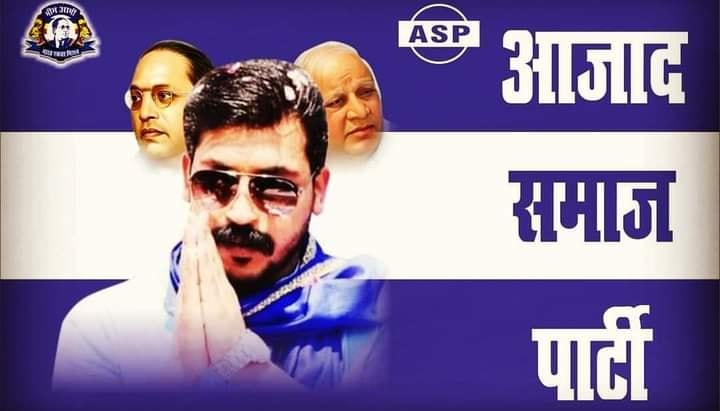Shifting Allegiances: Dalits in Uttar Pradesh Explore ASP and Congress Amidst BSP's Woes

Asad Rizvi, TwoCircles.net
Lucknow: Amid the Bahujan Samaj Party’s (BSP) existential crisis, Dalits seem to have begun exploring new political alternatives. They are apparently weighing their options between the Congress and the newly formed Azad Samaj Party-Kanshiram (ASP-Kanshiram).The community’s disenchantment with the Bharatiya Janata Party (BJP) is seemingly evident. At the same time, they are also reluctant to align with the Samajwadi Party (SP) due to historical Dalit-Yadav rivalries in villages.
From 2012 to 2024, the BSP, under Mayawati’s leadership, suffered defeats in three assembly and three general elections. These consecutive setbacks, coupled with a perceived lack of grassroots effort, have gradually eroded her influence over the past 12 years.
Chandrashekhar entered Parliament at a time when the BSP did not have any lawmakers in the Lok Sabha. All eyes are now on him to see how he champions issues faced by his community on the parliamentary floor.
In the 2024 general elections, Dalits largely supported the Congress-led India bloc. The Opposition’s narrative highlighting the “Constitution in danger” under the BJP regime resonated strongly within the marginalised community.
In several constituencies, Dalits also voted for SP candidates to safeguard reservations and protect the Constitution. They showed diminished reliance on Mayawati, who seemingly facilitated an easier contest for the BJP by withdrawing her nephew Akash Anand from the campaign and making changes in key constituencies.
Dalit intellectuals perceived that the SP garnered Dalit support due to its alliance with the Congress. They placed their trust in Congress leader Rahul Gandhi and voted for the SP in his name.
They also believe that once Dalits leave the BJP, they are unlikely to return soon. The community recognizes that supporting the BJP means undermining both the Constitution and reservation.
Therefore, despite leaving the BSP, Dalits will not go to the BJP for the time being. It is said that very few sub-castes currently aligned with the saffron party will continue to support it. Consequently, the party is not seen as an alternative to the BSP for 23 percent of Dalits in the state.
The SP cannot serve as a viable political alternative for dissatisfied Dalits who have left the BSP, due to the SP’s reliance on Yadav votes and the historical tensions between the two communities in villages.
The 2019 Lok Sabha elections also highlighted Dalits’ reluctance to support the SP. During the SP and the BSP alliance, the SP transferred its votes to the BSP, but the BSP did not reciprocate. As a result, the BSP won 10 seats while the SP only secured five.
The ASP chief contested against candidates from the BJP, the BSP and the INDIA bloc in the election and won by 1,51,473 votes. He received a total of 5,12,552 votes, while the BJP candidate got 3,61,079, the SP received 1,02,374, and the BSP candidate garnered 13,272 votes.
This Lok Sabha constituency comprises five assembly constituencies: Dhampur, Nathaur, Najibabad, Noorpur and Nagina. Nagina was previously part of the Bijnor Lok Sabha constituency before becoming a separate constituency following the 2007 delimitation.
Due to its significant Muslim and Dalit populations, this Lok Sabha seat has been pivotal in Dalit politics. In 1989, BSP leader Mayawati won this seat as an MP, and Congress’s Meera Kumar was victorious in 1985. In 2019, BSP candidate Girish Chandra, part of the SP-BSP alliance, won the seat.
Noted Dalit thinker Arun Khote says Chandrashekhar’s victory in the Nagina seat was largely due to strong support from Muslim and Dalit voters. The BSP traditionally considered this constituency a stronghold, but this time Dalits and Muslims chose Chandrashekhar over Mayawati in order to defeat the BJP.
He believes that considering Chandrashekhar’s victory as the beginning of a new Dalit politics is premature, as the Bhim Army chief “lacks” a specific Dalit agenda or a progressive ideology thus far.
He further commented that under these circumstances, Chandrashekhar’s ability to mobilize the Dalits of the state is limited; therefore, it can be inferred that if the Congress makes an effort, Dalits may align with them once again.
Ram Kumar, an advocate for Dalit rights, believes that Chandrashekhar aims to carry forward Kanshi Ram’s mission: the fate of which is is widely understood — despite its alliance with the BJP and multiple stints in state government, the BSP appears to operate under the BJP’s influence even today.
He asserts that establishing himself will require Chandrashekhar considerable time, noting that Dalits are gradually losing their allegiance to the BSP. Currently, the ASP’s influence is primarily limited to western Uttar Pradesh, and the party’s president’s popularity mainly resonates among the Dalit youth in that region.
Dalit rights activists also contend that despite efforts, Chandrashekhar’s party will take a substantial amount of time to emerge as a viable alternative to the BSP.
According to Kumar, if the SP and the Congress collaborate now, they could potentially attract the Dalit vote in the state and make significant strides in shaping political history.
